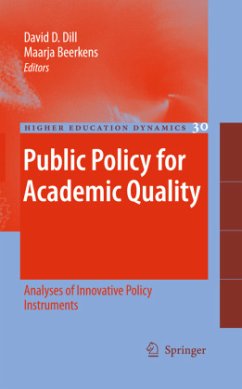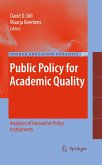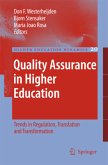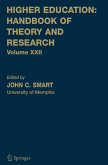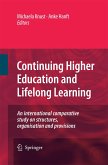Over the last decade the structure of higher education in most countries has undergone significant change brought about by social demands for expanded access, technological developments, and market forces. In this period of change the traditional concerns with access and cost have been supplemented by a new concern with academic quality. As a consequence, new public policies on academic quality and new forms of academic quality assurance have rapidly emerged and swiftly migrated across continents and around the globe.
The growing public debate about academic quality assurance within and across countries however has not always been well informed by analyses of the strengths and weaknesses of these new policy instruments. The Public Policy for Academic Quality Research Program (PPAQ) was designed to provide systematic analyses of innovative external quality assurance policies around the world. This volume presents the fourteen analyses of national policies on academic quality assurance conducted as part of the PPAQ Research Program utilizing the knowledge of informed international scholars. Each policy analysis examines the policy goals, implementation problems, and impacts of these newly developed national quality assurance instruments. The book concludes with an assessment of the lessons learned from these collected policy analyses and outlines the framework conditions that appear essential for assuring academic standards in the university sector.
The growing public debate about academic quality assurance within and across countries however has not always been well informed by analyses of the strengths and weaknesses of these new policy instruments. The Public Policy for Academic Quality Research Program (PPAQ) was designed to provide systematic analyses of innovative external quality assurance policies around the world. This volume presents the fourteen analyses of national policies on academic quality assurance conducted as part of the PPAQ Research Program utilizing the knowledge of informed international scholars. Each policy analysis examines the policy goals, implementation problems, and impacts of these newly developed national quality assurance instruments. The book concludes with an assessment of the lessons learned from these collected policy analyses and outlines the framework conditions that appear essential for assuring academic standards in the university sector.
From the reviews: "There is much of interest in this book for students of public policy for academic quality. An impressive array of talented authors contributes the case studies. Even if the reader is familiar with the specific topic, each chapter managed to produce some unusual nuggets of information in addition to capturing the main components of the debate over design and implementation. ... The volume, laudably, argues for scholarly, evidence-based, and reliable approaches to public-policy initiatives to assure academic standards and quality." (George Gordon, Educational Review, October, 2011) "Having an entire book discussing the concept of academic quality ... is very innovative and instructive. ... Public policy for academic quality does a very good job in including instruments of analysis which help the reader to understand academic quality in many forms. ... The main focus of Public policy for academic quality on academic quality and its illustrations through country case studies makes this book a very pleasant read. Many instruments are student-based regulations, which help to illustrate policies and instruments for lifelong learning." (Ali Ait Si Mhamed, International Review of Education, Vol. 57 (5-6), December, 2011)

